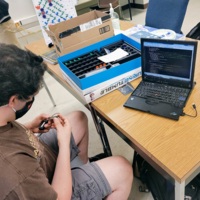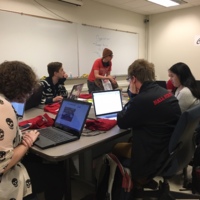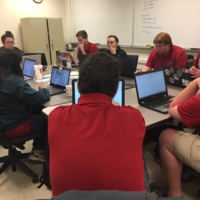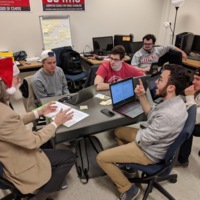Student impact
Student impact
CS4MS+ has a positive effect on BSU students. It offers an experience unlike any other CS course. Some participants expressed interest in teaching CS in elementary or secondary schools as a result of their experiences in CS4MS+. Being student-led, participants’ NACE workforce competencies are drastically improved by the end of their participation.
Student control
With the exception of the first month each semester, the students were largely in control of their destiny, activities, and learning. During the first month, the faculty mentor provided a series of guided discussions and other opportunities to become immersed in the foundational knowledge and experiences that would allow them to move forward on their own to determine the specific direction of CS4MS+. The students engaged in inclusive and culturally responsive pedagogy training, team building exercises, created and worked in teams to evaluate our partners' needs, compiled and analyzed the results, investigated, developed, modified, and validated modules, and delivered the validated resources to our partner for implementation.
Even though the faculty mentor met with the school administration prior to each semester, the students had control over their learning experiences. The mentor worked to establish a solid foundation with the partners, which allowed the students to be more effective throughout the immersive learning experience. The students determined what the CS4MS+ deliverables were going to be, and how and on what schedule they were going to be produced and delivered. After the first month, the faculty mentor served largely as a resource, rather than a leader or guide.
Student collaboration
Initially, the students worked as a large group each semester, but they soon recognized the need for smaller working groups to develop our deliverables in parallel. Once they formed these smaller groups, they became much more productive and cohesive as a group. Productivity increased dramatically at that point, as they better understood how to work as a team and communicate between the smaller working groups.
Collaboration with the community partners included data-gathering, validation, and status report meetings throughout the semester. A few weeks into most semesters, the students were able to observe classes to gain an understanding of what was being provided, and the environment in which they were working. The 2017 project team developed and delivered a workshop for the computer teachers. They also developed and presented an Hour of Code activity to all seven computer classes the last week of the semester, directly interacting with the NMS students. During 2019 and 2021, CS4MS+ teams developed and presented a variety of CS topics directly to the partners’ students.
Student learning outcomes
- Students experienced and participated in the following activities and experiences during each semester:Create a constructive collaborative climate.
- Apply previous knowledge or skills to demonstrate comprehension and performance in novel situations.
- Create, document, and curate problem- and inquiry-based learning resources which are user-tested and accessible to all.
- Plan, manage, present, and evaluate a multi-week project developed by small teams using an incremental and iterative approach.
- Demonstrate reflective practice for professional improvement.
- Demonstrate strengthened workforce competencies, as defined by NACE. These competencies are:
- Critical Thinking/Problem Solving
- Oral/Written Communications
- Teamwork/Collaboration
- Digital Technology
- Leadership
- Professionalism/Work Ethic
- Career Management
- Global/Intercultural Fluency
"Participating in this course allowed me to build on many skills that will be useful in future careers. In particular, this course has improved my communication and collaboration skills." ~Participating student
Warning: Undefined array key "imgAttributes" in /home/digita63/public_html/immersive-learning-showcase-2021/plugins/ExhibitBuilder/views/helpers/ExhibitAttachment.php on line 30
Warning: Undefined array key "imgAttributes" in /home/digita63/public_html/immersive-learning-showcase-2021/plugins/ExhibitBuilder/views/helpers/ExhibitAttachment.php on line 30
Warning: Undefined array key "imgAttributes" in /home/digita63/public_html/immersive-learning-showcase-2021/plugins/ExhibitBuilder/views/helpers/ExhibitAttachment.php on line 30
Warning: Undefined array key "imgAttributes" in /home/digita63/public_html/immersive-learning-showcase-2021/plugins/ExhibitBuilder/views/helpers/ExhibitAttachment.php on line 30



